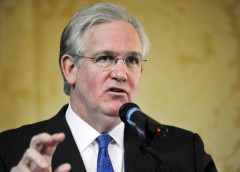FERGUSON Mo. (Reuters) – Missouri’s governor declared a state of emergency on Monday and authorized the state’s National Guard to support police in case of violence after a grand jury decides whether to indict a white police officer who fatally shot an unarmed Black teenager.
“As part of our ongoing efforts to plan and be prepared for any contingency, it is necessary to have these resources in place in advance of any announcement of the grand jury’s decision,” Governor Jay Nixon said in a statement. The order also puts the St. Louis County Police Department, rather than police in Ferguson, Missouri, in charge of policing protests.
Residents of Ferguson, which saw weeks of sometimes violent protests following the Aug. 9 shooting death of 18-year-old Michael Brown, are braced for the possibility of more unrest, particularly if the grand jury decides not to criminally charge Ferguson police officer Darren Wilson.
The past two days have seen protests around the area in anticipation of the grand jury’s report. Several dozen demonstrators took to the streets on Monday in Clayton, Missouri, where a grand jury is meeting.
“We want an indictment. The cops don’t like it,” the protesters chanted as they marched in freezing temperatures.
“Something about the way Mike Brown was killed started a fire in me that I can’t ignore,” said one of the demonstration’s organizers, Dhorbua Shakur, 24.
He said he had little sympathy for area residents who are tired of the demonstrations, which left some businesses in Ferguson burned out.
“They can turn this off and on with a TV screen. But this is my reality. This is my life,” Shakur said.
Decision Expected This Month
Some area schools have told parents they will dismiss students early when the decision comes and many businesses near the stretch of downtown that saw the worst rioting after Brown’s killing have boarded up their windows as a protective move.
Officials have said the grand jury’s decision is likely to come this month.
Video and audio published over the weekend by the St. Louis Post-Dispatch showed Wilson leaving the police station and returning to it hours after the shooting.
There are conflicting accounts of what happened, with some witnesses saying Brown had his hands up in surrender when he was shot and others describing a physical altercation between Brown and Wilson.
Many protesters expressed anger at word over the weekend that Wilson may be able to return to his job if he is not indicted, although local police said he would be fired immediately if charges are brought.
Protest organizers planned to demonstrate at the Ferguson Police Department when the grand jury’s decision comes back, and later at the county courthouse in Clayton.
Ferguson Mayor James Knowles expressed confidence on Monday in the city’s police department and its chief, Thomas Jackson.
“Right now, what we need is continuity in the police department and the chief has made tremendous relationships with a number of protesters and so I think that’s what those protesters want,” Knowles said. “The conversations we have been able to have with people have been very productive. … We need to have a mutual understanding before we can move forward.”
(Editing by Doina Chiacu and Peter Cooney)




